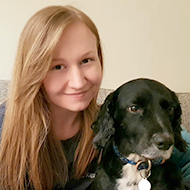
Project to see if therapeutic exercise can manage pain more effectively than walking.
A veterinary nursing student at Harper Adams University is seeking pet owners whose dogs suffer from joint stiffness to take part in a new study.
Zoe Bramham, whose own dog Millie has canine osteoarthritis, will lead the project - which aims to see if controlled and therapeutic exercise routines can help manage pain more effectively. Specifically, Zoe aims to see whether a therapeutic exercise routine for dogs instead of a walk can have a beneficial effect.
Zoe explained: “I have chosen this topic as it's personal for me, due to my own dog having osteoarthritis. I wanted to explore how one of the most common pieces of advice given by vets to owners of arthritic dogs - to reduce or alter exercise - can impact both dog and owner and whether the option of therapeutic exercise could potentially improve symptoms of pain.
“It is a topic that is being investigated more in human medicine and has shown promise for reducing pain in arthritic humans, but is not a widely recommended management technique in veterinary medicine due to limited research.”
The study takes place over three weeks, and those wishing to take part must first complete a Liverpool Osteoarthritis in Dogs (LOAD) questionnaire and gain veterinary consent. Participants will be randomly assigned to one of two groups, in which they will adjust their dog's exercise routine to two or three 20 minute walks a day.
Zoe will then ask the other group to complete a short therapeutic exercise routine two times a week instead of walking. At the end of each week, she will ask each group to fill in a pain score and exercise questionnaire.
Owners can take part in the study from home, and they will not be required to make any changes to their pet’s current medications or therapies. For more information email Zoe at 16249500@live.harper.ac.uk



 The latest
The latest